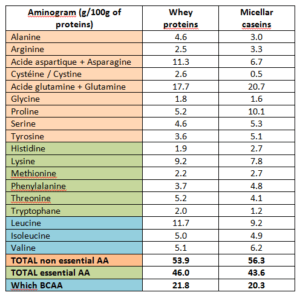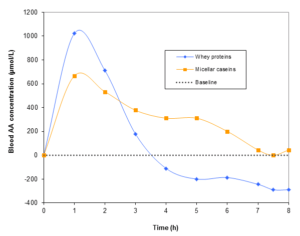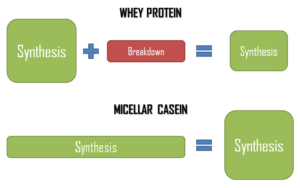What is the interest of micellar caseins in sports?
4 June 2019
Performance improvement is always associated with muscular development. And for this, there is no secret: a good training and an adequate nutrition are essential.
As far as the diet is concerned, it must provide sufficient amount of proteins because these are fundamental building blocks for muscles. For practical reasons, it is often more interesting for athletes to consume protein supplements. And micellar caseins can truly represent a high-quality product! Let this article convinces you!
Micellar caseins? What is it?
Milk contains two types of proteins: soluble proteins (commonly named “whey protein”) and micellar caseins. They respectively represent around 20% and 80% of milk proteins1.
Composition-wise, these proteins are quite similar: the essential amino acidsA contents are very close, like the amount of BCAAB (table 1). Those have a positive effect on the protein metabolism: they promote muscular protein synthesis and reduce breakdown2 3. Leucine is the most important BCAA to stimulate this synthesis. According to the 2018 ISSN (International Society of Sports Nutrition) report on sport nutrition recommendations, the ideal dose of Leucine in order to take advantage of these anabolic effects is likely to be somewhere between 1.7 and 3.5g 2 4.
The main difference between these two protein groups is mainly the digestion speed. Whey proteins are quickly digested and are totally absorbed in about 3 hours. Meanwhile, the assimilation of micellar casein is more progressive and will take up to 7 hours5.

Table n°1: Aminogram of whey proteins and micellar caseins 6 7
But after my workout I want fast proteins! Why would caseins be interesting for me?
“Fast proteins” don’t have only advantages. Yes they are quickly absorbed; on the other hand the blood amino acids concentration suddenly decreases after a few hours. It decreases to such an extent that it reaches lower levels than the initial concentration before protein ingestion. (baseline in figure 1)5.

Figure 1: Blood amino acids concentration as a function of time.
In this study5, healthy persons have consumed either a dose of whey (Δ) or micellar casein (O). Blood amino acids concentration was then measured during 8 hours. Baseline: it corresponds to the basal amino acids concentration, i.e. the concentration before protein consumption.
When the blood amino acids concentration is higher than the baseline, muscular protein synthesis is stimulated. However, when it is below, protein breakdown will be promoted…
Although I was told that caseins are anti-breakdown proteins, are they also anabolic proteins? This could be a reason to consume it before going to sleep?
That’s true, this is an excellent product to take just before sleep to have a good amino acids supply throughout the night! Because these proteins are effectively well absorbed and assimilated by the body even if you are sleeping8.
However, there truly is an effect on the muscular protein synthesis. And this has been demonstrated during a 2012 study in which 15 healthy men have taken either caseins or a placebo before sleep. During the night, muscular protein synthesis and breakdown were measured. From these measurements, we discovered that caseins did not really have an effect on protein breakdown, while they did promote synthesis8 9.
Moreover, there is another interesting reason to take caseins before sleep: different studies, especially one conducted on professional soccer players, have proven that caseins enable not only performances and recovery improvement (by muscular protein synthesis promotion), but also muscular soreness reduction10 11.
Ok, but since caseins are slowly absorbed, does it contribute as well as whey protein to the muscular protein synthesis?
Yes they do! A study conducted in 2011 has measured muscular protein synthesis in 17 healthy men. Subjects have consumed either whey proteins, or caseins, or water (control group) after a resistance type exercise. After a 6 hours period, the results showed that caseins stimulate muscular protein synthesis with the same efficacy as whey proteins12!
Other studies have compared the effects of whey proteins and caseins on performances and body composition; and they have demonstrated that there is no significant difference between these two proteins13.
Both proteins stimulate muscular protein synthesis in the same manner, but whey proteins seem to promote protein breakdown after a few hours… In this situation, caseins seem to be more interesting, aren’t they?
Indeed, that is the question we may ask ourselves. If we have a look at the global protein balance, we may venture the hypothesis that caseins might be more interesting than whey protein (figure 2)5.

Figure 2: Global protein balance prediction obtains with whey protein and micellar caseins consumption5.
On the market, we can find caseinates. These proteins are obtained by chemical process, whereas micellar caseins are produced through a non-denaturing process. This allows the native structure of proteins to be preserved. At the moment, Ingredia is conducting studies in order to better characterize and compare these two proteins.
For more information, please contact us
Authors: Rémi Maleterre & Audrey Boulier.
A [Essential Amino Acids]: Amino acid that the body cannot synthesize. Therefore they must be supplied by the diet.
*B [BCAA, Branched-Chain Amino Acids]: Essential amino acids which correspond to Leucine, Isoleucine and Valine
______________________________________________________________________________
[1] Swaisgood H.E. (1982). Chemistry of milk protein. Fox P.F. (e.): Developments in Dairy Chemistry. Elsevier Applied Science Publishers, London, UK, 1-59.
[2] Kerksick C.M., Wilborn C.D., Roberts M.D., Smith-Ryan A., Kleiner S.M., Jäger R., Collins R., Cooke M., Davis J.N., Galvan E., Greenwood M., Lowery L.M., Wildman R., Antonio J. and Kreider R.B. (2018). ISSN exercise & sports nutrition review update: research & recommandations. Journal of the International Society of Sports Nutrition, 15:38. Epub August 01, 2018. https://doi.org/10.1186/s12970-018-0242-y
[3] Imanipour V., Banaiifar A., Mahdi F., Naderi A., Sadeghi M. (2018). The effects of branch-chain amino acids on fatigue in the athletes. Interventional Medicine and Applied Science 2061-5094. Epub March 19, 2018. https://doi.org/10.1556/1646.10.2018.10
[4] Jager R., Kerksick C.M., Campbell B.I., Cribb P.J., Wells S.D., Skwiat T.M., Purpura M., Ziegenfuss T.N., Ferrando A.A., Arent S.M., Smith-Ryan A.E., Stout J.R., Arciero P.J., Ormsbee M.J., Taylor L.W., Wilborn C.D., Kalman D.S., Kreider R.B., Willoughby D.S., Hoffman J.R., Krzykowski J.L., Antonio J. International society of sports nutrition position stand: protein and exercise. J Int Soc Sports Nutr. 14:20. Epub June 20, 2017. https://doi.orf/10.1186/s12970-017-0177-8
[5] Lacroix M., Bos C., Léonil J., Airinei G., Luengo C., Daré S., Benamouzig R., Fouillet H., Fauquant J., Tomé D., Gaudichon C. (2018). Compared with casein or total milk protein, digestion of milk soluble proteins is too rapid to sustain the anabolic postprandial amino acid requirement. Am J Clin Nutr 2006; 84:1070–9/ Epub January 23, 2018. https://doi.org/10.1556/1646.10.2018.10
[6] Ingredia. Prodiet 87 B Fluid – Nutrition facts . December 11, 2015.
[7] Ingredia. Prodiet 90 S – Nutrition facts . March 18, 2016.
[8] Res P.T., Groen B., Pennings B., Beelen M., Wallis G.A., Gijsen A.P., Senden J.M., Van Loon L.J. (2012) . Protein ingestion before sleep improves postexercise overnight recovery. Med Sci Sports Exerc 2012;44:1560–9. Epub January 2012. https://doi.org/10.1249/MSS.0b013e31824cc363
[9] Rasmussen C.J. (2008). Nutritional Supplements for Endurance Athletes. Nutritionnal supplements in sports and exercise, 369-407. https://doi.org/10.1007/978-1-59745-231-1_11
[10] Abbott W., Brett A., Cackburn E., Clifford T. (2019). Presleep casein protein ingestion: acceleration of functional recovery in professional soccer players. Int J Sports Physiol Perform. 14(3):385-391. Epub Feb 17, 2019. https://doi.org/10.1123/ijspp.2018-0385
[11] Snijders T., Res P.T., Smeets J.SJ., Van Vliet S., Van Kranenburg J., Maase K., Kies A.K., Verdijk L.B., Van Loon L.JC. (2015). Protein ingestion before sleep increases muscle mass and strength gains during prolonged resistance-type exercise training in healthy young men. The Journal of Nutrition, 145(6):1178-1184. Epub April 29, 2015. https://doi.org/10.3945/jn.114.208371
[12] Reitelseder S., Agergaard J., Doessing S., Helmark I.C., Lund P., Kristensen N.B., Frystyk J., Flyvbjerg A., Schjerling P., Van Hall G., Kjaer M., Holm L. (2011). Whey and casein labeled with L-[1-13C]leucine and muscle protein synthesis: effect of resistance exercise and protein ingestion. Am J Physiol Endocrinal Metab, 300, pp. E231-E242. Epub January 01, 2011. https://doi.org/10.1152/ajpendo.00513.2010
[13] Wilborn C.D., Taylor L.W., Outlaw J., Williams L., Campbell B., Foster C.A., Smith-Ryan A., Urbina S., Hayward S. (2013). The effects of pre- and postexercise whey vs. casein protein consumption on body composition and performance measures in collegiate female athletes. J Sports Sci Med 2013;12:74–9. Epub March 01, 2013. https://www.ncbi.nlm.nih.gov/pmc/articles/PMC3761774/